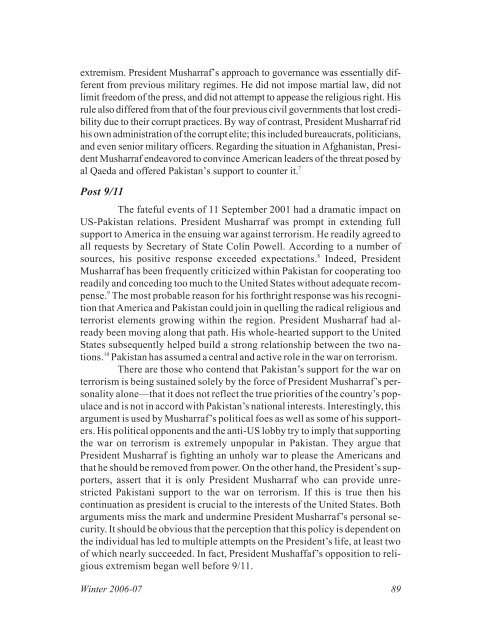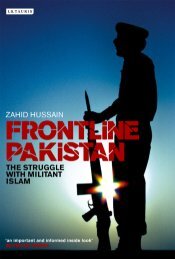US-Pakistan Relations: The Way Forward - Arz-e-Pak
US-Pakistan Relations: The Way Forward - Arz-e-Pak
US-Pakistan Relations: The Way Forward - Arz-e-Pak
Create successful ePaper yourself
Turn your PDF publications into a flip-book with our unique Google optimized e-Paper software.
extremism. President Musharraf’s approach to governance was essentially differentfrom previous military regimes. He did not impose martial law, did notlimit freedom of the press, and did not attempt to appease the religious right. Hisrule also differed from that of the four previous civil governments that lost credibilitydue to their corrupt practices. By way of contrast, President Musharraf ridhis own administration of the corrupt elite; this included bureaucrats, politicians,and even senior military officers. Regarding the situation in Afghanistan, PresidentMusharraf endeavored to convince American leaders of the threat posed byal Qaeda and offered <strong><strong>Pak</strong>istan</strong>’s support to counter it. 7Post 9/11<strong>The</strong> fateful events of 11 September 2001 had a dramatic impact on<strong>US</strong>-<strong><strong>Pak</strong>istan</strong> relations. President Musharraf was prompt in extending fullsupport to America in the ensuing war against terrorism. He readily agreed toall requests by Secretary of State Colin Powell. According to a number ofsources, his positive response exceeded expectations. 8 Indeed, PresidentMusharraf has been frequently criticized within <strong><strong>Pak</strong>istan</strong> for cooperating tooreadily and conceding too much to the United States without adequate recompense.9 <strong>The</strong> most probable reason for his forthright response was his recognitionthat America and <strong><strong>Pak</strong>istan</strong> could join in quelling the radical religious andterrorist elements growing within the region. President Musharraf had alreadybeen moving along that path. His whole-hearted support to the UnitedStates subsequently helped build a strong relationship between the two nations.10 <strong><strong>Pak</strong>istan</strong> has assumed a central and active role in the war on terrorism.<strong>The</strong>re are those who contend that <strong><strong>Pak</strong>istan</strong>’s support for the war onterrorism is being sustained solely by the force of President Musharraf’s personalityalone—that it does not reflect the true priorities of the country’s populaceand is not in accord with <strong><strong>Pak</strong>istan</strong>’s national interests. Interestingly, thisargument is used by Musharraf’s political foes as well as some of his supporters.His political opponents and the anti-<strong>US</strong> lobby try to imply that supportingthe war on terrorism is extremely unpopular in <strong><strong>Pak</strong>istan</strong>. <strong>The</strong>y argue thatPresident Musharraf is fighting an unholy war to please the Americans andthat he should be removed from power. On the other hand, the President’s supporters,assert that it is only President Musharraf who can provide unrestricted<strong><strong>Pak</strong>istan</strong>i support to the war on terrorism. If this is true then hiscontinuation as president is crucial to the interests of the United States. Botharguments miss the mark and undermine President Musharraf’s personal security.It should be obvious that the perception that this policy is dependent onthe individual has led to multiple attempts on the President’s life, at least twoof which nearly succeeded. In fact, President Mushaffaf’s opposition to religiousextremism began well before 9/11.Winter 2006-07 89













